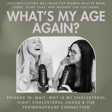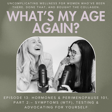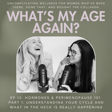Introduction to 'What's My Age Again?' Podcast
00:00:00
Speaker
Welcome to What's My Age Again, the realest podcast for women who are done chasing trends and ready to feel empowered. Hi, I'm Kim. And I'm Tanya, holistic nutritionists and childhood best friends who've been there, done that, and bought the collagen.
00:00:16
Speaker
more than once. Each week we provide actionable steps that you can start today to help you thrive through every decade to come. We're cutting through the wellness noise to bring you honest conversations about aging, hormones, health, beauty, mindset, and everything in between.
Mission: Aging Gracefully with Honesty
00:00:33
Speaker
You see, we're also on a mission to age gracefully one WTF moment at a time. Backed by research and real life, we're here to share what actually works, what's a waste of time, and how to truly thrive through the messy, magical midlife transition.
00:00:49
Speaker
We're so happy you're here. Let's dive in. Hi, everybody. Welcome back to What's My Age again. Hey, everybody. Hi, Kim. How are you? I'm good. I'm really, really excited about this episode. It's actually one of my favorite topics.
Episode Topic: Nervous System and Stress Resiliency
00:01:08
Speaker
ah to let you know, is actually one of my favorite topics as well that I didn't realize was my favorite topic. So, exactly. So our, so today we're really going to dive into the nervous system. We're going to talk about stress resiliency. We're going to talk about mindset.
00:01:26
Speaker
You know, when Tanya and I were talking about what episodes to, to, when we were talking about our calendar and how to program our episodes, we really wanted to get into this topic because
Modern Life and Holiday Season Stress
00:01:38
Speaker
so many clients and people feel that,
00:01:41
Speaker
Leading up to that holiday season, this time of year is stressful. You know, we have a lot going on. We all have, you know, we may have jobs, families.
00:01:52
Speaker
Some of us have aging parents, social obligations. And, you know, with upcoming holiday season, we have more in our calendar than ever before. Right. And this busy go, go lifestyle, first off, is not how we're meant to live our lives. Unfortunately, it is the reality for the majority of us because we are living in 2025, but this is not how our archaic brain or body is meant to live.
00:02:18
Speaker
So when we have full calendars, when we are overwhelmed all of the time, our stress levels are through the roof.
Changing Perceptions of Stress
00:02:27
Speaker
So again, This isn't an episode on removing stress.
00:02:31
Speaker
Again, I wish we could. Like, I mean, if you guys know how to remove the stress from your life, call me, please. But this is an episode that talks about how we can potentially shift our views surrounding stress and what that means.
00:02:48
Speaker
um And also increase, as you just said, Kim, our resilience to stress. So make that armor even stronger. So instead of, you know, taking us down, it's maybe a little clink in our armor.
00:03:01
Speaker
And these are going to be the ways that are going to help protect us during these busy seasons. And quite frankly, it's every day of our busy, busy lives.
Practicing Stress Resiliency and Mindfulness
00:03:11
Speaker
Totally. And I think, you know, just the first thing that came to my mind when you're saying that is bringing that control back.
00:03:18
Speaker
Because I know so many people are like, feel that out of control feeling of my life is just stressful. Or I can't, you know, even with anxiety in general, sometimes it feels very out of control.
00:03:29
Speaker
But there are so many things that we can do to help take our power back. And as you said, Tanya, support that stress resiliency. And that being said too, this is a practice.
00:03:41
Speaker
I know I always say that and guys, you can eye roll at me. I'm used to it. Eye roll away. This is a practice and it means that you really have to make the effort to consistently make time for a lot of things in your life that are foundational when it comes to stress resiliency and even our mindset.
00:04:00
Speaker
I can't wait to talk about this, but I'm jumping ahead, surrounding stress and what that actually means.
Understanding Sympathetic and Parasympathetic Systems
00:04:07
Speaker
So we live in a go, go, go, go society, right?
00:04:11
Speaker
And we've talked about being continuously in fight or flight, which also AKA is what we refer to as being in the sympathetic nervous system mode. We live less of our time in rest and digest,
00:04:26
Speaker
which is where we want to be, which is referred to as the parasympathetic nervous system. um And this is where we do all of our healing.
Tanya's Personal Story on Stress Management
00:04:36
Speaker
And let me tell you something quick before we get into it Guys, I have tea.
00:04:40
Speaker
Are ready? Kim, you know the tea. I have major tea. So for me, this actually has become one of my favorite topics that I never knew was going to be my favorite topics.
00:04:52
Speaker
Because remember a few episodes back when we were talking about perimenopause and all those hormones and 101, and i had made my peace with probably not getting my period again? She's back.
00:05:04
Speaker
And she came back literally over 250 days into my cycle. And Kim, you know it. I thought I was supporting my nervous system. I thought I really had a handle on my mindset and stress and making my body resistant to it.
00:05:21
Speaker
And in the last eight months, I turned that up to 100 and realized how much more space there was for improvement. And that is the base of my pyramid and literally the base of my period. And she's back.
00:05:33
Speaker
So everybody, take a collective moment to cheer out your car windows while you're walking. Let people stare at you. Be happy for me because this is huge. Tanya's still in perimenopause, folks.
00:05:45
Speaker
But you know what, Tanya, that was your missing piece. And it's so interesting because, you know, so many times when I speak to clients, they want the right diet, obviously. They want movement. They want to talk supplements. What can I do, do, do, do do to improve my health?
00:06:03
Speaker
And sometimes, like some of the things we're going to get into today They sound so simple.
Fundamentals of Stress Management
00:06:10
Speaker
Like moving your body from that, as Tanya said, sympathetic system, go, go, go to the parasympathetic system, sometimes just requires you taking a few deep breaths or focusing on your breath or legs up the wall. and we're going to get into these modalities in a second, but that sometimes just doesn't seem, it seems too easy.
00:06:29
Speaker
So we forget to program it into our day. And that's why I get so excited about this topic because as Tanya says with her analogies all the time, it is found foundational. It is the base of our pyramid.
00:06:43
Speaker
So that diet, that lifestyle pieces all go on top of that. And if we don't have this, as you just mentioned in your example, It can be that missing piece, that missing key that we need.
00:06:57
Speaker
To all of the things, you know, for me, it was definitely for my, you know, my, my period, my hormones. So let's roll into then...
Setting Boundaries for Energy Management
00:07:07
Speaker
The first kind of portion that I think is so important, if I was to do a TED talk, if you know, you know, my friends are always like, girl, you got do a TED talk on setting boundaries.
00:07:16
Speaker
I'm great at setting boundaries. I'm just that girl. So when I think about stress and resilience and mindset surrounding stress, the first thing that comes to mind um that I talk about a lot with my clients is setting boundaries, but setting boundaries as nervous system protection.
00:07:36
Speaker
We want to be safe, right? Our body wants to be like safe and loved and cozy magosi. So setting boundaries creates safety. And that's what our nervous system is craving, right? And I always say to reframe your boundaries as energy budgeting.
00:07:56
Speaker
Kim, do you feel and an analogy coming on? I love it. Yep. Go ahead. The analogy being is that think about every single time in your life that you say yes to something.
00:08:07
Speaker
Okay. That costs your nervous system. Okay. That costs your nervous system energy and it costs it elevated stress. So like you would balance your bank account.
00:08:18
Speaker
So your physical money. So you never run out of your physical money by you saying, oh I'm not going to buy this. so I'm not going order this from Amazon or whatever. Setting boundaries when it comes to your energy and your nervous system and your schedule literally helps you never run out of your energy.
00:08:38
Speaker
And that is huge. That is huge, Tanya. And I think all of us can attest to feeling, you know, at the end of our rope or feeling just depleted. That's a perfect example of your energy budget running out.
00:08:53
Speaker
And I think one of our first episodes, we talked about doing a inventory of looking where your energy is going. And so, you know, that is key for this as well. Like, you know, work is a big one, family's a bur big one, but exactly as Tanya said, are you saying yes to certain things that maybe you don't need to, or maybe you can free frame it in a different way? Social media piece, being online, scrolling, right?
00:09:19
Speaker
watching that Netflix documentary where you should be sleeping. All of those things that are zapping your energy and nervous system are taking from that energy account. Correct. And this is lowering and weakening overall your resilience to stress.
00:09:36
Speaker
So when stressful things are happening and going on, that's when you're feeling more overwhelmed, more frazzled, like more out of control, like Kim said. And there's boundaries in terms of saying yes and no to things.
00:09:48
Speaker
And there's also boundaries in terms of protecting your peace. So this is a big one for me of protecting your peace in relationships. Um,
00:09:59
Speaker
we all choose to have relationships with certain people. We choose our friends. we well We don't choose our family, but you know, we don't necessarily choose our coworkers. But so sometimes there's a lot of choice in relationships and sometimes there isn't.
Energy Budgeting in Relationships
00:10:12
Speaker
And relationships can cause stress for a myriad of different reasons. Some stress can run exceptionally deep in traumatic relationships to stress where you're just like, this person is annoying. They are an energy vampire.
00:10:23
Speaker
Absolutely not. But making these boundaries in relationships is protecting your peace. What are you allowing for yourself to give in a relationship and what are you making it okay to receive?
00:10:38
Speaker
So if you have a coworker, you know, that you just want to literally say, I can't even Susan, sorry for everybody's name, about susan you know, just what came to my mind. I can't even Susan.
00:10:49
Speaker
How can you reframe that again, you know, mindset towards stress to know that you have to see Susan every day. How can you put those, you know, protecting your peace in the relationship, and making peace with the interactions you have to have to minimize that stress.
00:11:05
Speaker
Because we're with people all the time. And if we don't learn to protect our peace and how we show up in certain relationships, that is going also continue to lower our resilience to stress and keep us in that sympathetic fight or flight mode.
00:11:20
Speaker
ah Yeah, Tanya, that's so, it's such a good point. And even just, I think all of us can pay a little more attention to our own energy. You can feel it in your body when you are in a stressful relationship and that is greatly affecting your health, you know? And I know, as Tanya said, some people...
00:11:40
Speaker
are in our in our life, but protecting your boundaries and figuring out a way to, you know, but like you said, Tanya, protect your peace.
00:11:52
Speaker
And maybe yeah like in terms of the holiday season coming up, maybe looking at your calendar and giving yourself a little break after being with Susan at the office party might be a way to help your boundaries. Okay, I know this is going to be stressful.
00:12:06
Speaker
I'm going to need a little like...
00:12:10
Speaker
Breathing session. Yeah. And that literally is. Exactly. And that's creating a buffer zone, yeah right? We talked about that like in a previous podcast, creating a buffer zone, not only in your schedule day to day. So you're not go, go, go, but creating a buffer zone between the energy Susan took for you so you can replenish it before your next task.
00:12:30
Speaker
So you are not going to your next task or your next event or whatever it is in fight or flight previously drained. Right? So that's so important. Absolutely, Tanya.
00:12:42
Speaker
No, I think, and I think that's a big one coming up. It might be, you know, we I think we're going to have another boundary episode coming up towards, um,
Integrating Joy into Daily Routines
00:12:51
Speaker
towards the holiday season, but absolutely. It's such an important piece in your nervous system is who you surround yourself.
00:12:59
Speaker
And the opposite can be true too. Who is it that surrounds yourself that fills your cup, that you just feel energized around and good around? Surround yourself with those people. As much as possible. of all Yeah. Absolutely.
00:13:12
Speaker
Absolutely. um I think another piece of it too in protecting your energy is how do we begin our day? That's a big one for me. It's a huge one for me.
00:13:22
Speaker
And I think we talked about it in another episode, so I won't get too much into it today, but you can go back and listen to, I think it was episode one, but we can put it in the show notes. Um, but starting your day for somebody else can take your energy in a new direction.
00:13:39
Speaker
Like if you start with the work emails, all of a sudden you're, you're putting out fires as opposed to starting your day with intention and really supporting your own nervous system and your own energy to then move into your day.
00:13:53
Speaker
with Right. And that's so huge as well. And that also kind of piggybacks onto um that joy piece, that cultivating joy. And I feel like I want to talk a lot more about that a little bit later when we talk about mindset, but adding joy to our everyday life.
00:14:08
Speaker
Again, I'm not going to go on and on about this. We all have things to do, but don't tell me. that in the spaces in between the five minutes, the 10 minutes, you can't put something in that's joyous.
00:14:19
Speaker
Put your favorite band on and freaking dance your heart out. Do it when you have to vacuum, but find joy in your day. You know, and you can do it. You're doing it right now. We're joyous. And you're listening to the podcast. congrats You know what though, Tanya, this is, I think this demands us to kind of touch on this a little bit more because when I talk to clients too,
00:14:41
Speaker
Everybody has a to-do, like self-care, for example. Okay. People know, people are talking about diet. They're starting, you know, their movement routine in the morning, even mindfulness, it becomes like a to-do list. Okay. I'm going to meditate or I'm going to do my, but this joy piece, so many clients and people just don't plug it into their lives or don't have it in their to-do list. And like Tanya said, it can be so simple. What brings you joy into your life that's not on your to-do list?
00:15:12
Speaker
Maybe it's art. Maybe it's dancing, singing. Maybe it's time with a friend that you just, you know, you know that if you pick up the phone and have that conversation, you're going to feel better at the end of it. But plugging in that joy day to day is so important.
00:15:27
Speaker
I couldn't agree more. And I think that It's really important to touch upon specific energetic practices that obviously, hence the name, not only work alongside like our body's actual energy, but biochemically work within the
Role of the Vagus Nerve in Healing
00:15:45
Speaker
body as well. But I think before we do that, we should maybe nutshell something called the vagus nerve.
00:15:50
Speaker
Kim, help me out. I call it different things sometimes. Like Kim, I feel you're the authority on pronunciation. Vagus nerve, vagus nerve. How do you say this? I say vagus nerve.
00:16:01
Speaker
But you know what? I don't know. You're right. Okay. I say vagus nerve, I think too. Okay. but so Either way, it's important. So Tanya at the beginning talked about the sympathetic and the parasympathetic nervous system, right? That sympathetic state where you know, we are in that fight or flight mentality.
00:16:20
Speaker
The vagus nerve helps turn on that parasympathetic system. And it's actually, it's a nerve that goes from our brainstem all through our throat. And it's kind of like the super highway that like ah it goes through all of the organs in our body, our lungs, our heart, our digestive organs in our gut.
00:16:41
Speaker
and And like I said, it's communication with all of these organs through our brain and activates that parasympathetic nervous system. So yes, it gets us into rest and digest. The issue is so many of us don't really know and understand a lot about the vagus nerve. It is coming out more mainstream, but that aside is we're definitely not giving it enough love and we don't have to know it in detail and go into detail.
Stimulating the Vagus Nerve for Calmness
00:17:10
Speaker
That could be for podcast on its own to just simply look into some of these energetic practices. But I think
00:17:18
Speaker
To understand that this is a very important nerve and it really is responsible to get us into that rest or digest will make us understand more some of the reasons why we're suggesting these kind of practices.
00:17:29
Speaker
For sure, Tanya. It regulates things like our digestion, our heart rate, our mood, inflammation, and like you said, healing, that he brings us into that healing state. And that includes our hormones, which we just discussed.
00:17:45
Speaker
A thousand percent. So, and also Kim, you just said, it's like this big highway. We're both like doing these gestures. You guys can't see, but from the base of our skull, crisscrossing and wrapping through our body, touching and going through different parts of the organ.
00:17:58
Speaker
So here's something that has been so instrumental to me. One of the energetic practices um
00:18:07
Speaker
probably since January, somewhat regularly, um is bilateral tapping. So it literally helps connect left brain to right brain and remind the vagus nerve that it's crossing over the whole body and that we are connected. We're not just in the one mode. We're not just in fight or flight. You know, it helps us universe, universe, uh, no,
00:18:35
Speaker
What's the I'm looking for, Cam? Unite? It's not what I wanted to say. Helps the body unite as one and remind the body we're running as one. It helps us to bring calmness and to connect each side. So like if you right now take your arms and cross them to each side of your shoulder, like you're giving yourself a little hug almost, um, that's comforting as it is. And then just kind of be tapping each side and the other.
00:19:02
Speaker
That is basically like a little butterfly that's bilateral tapping. And just that motion really can help bring you into the parasympathetic in nervous system mode. Absolutely.
Nature and Grounding Rituals
00:19:14
Speaker
And one thing that I do every single day is spend time in nature.
00:19:20
Speaker
Nature is so wonderful at putting us into that parasympathetic mode, even just looking and like you're like everything from sight to sound to smell, listening to running water or air, like a breeze through the trees or all of that puts us into that, activates that parasympathetic nervous system.
00:19:45
Speaker
Yeah, it makes such ah a huge difference. I'm staring at the trees outside right now in the forest. And like I can tell you, it's a big difference working here than, you know, working to other places where used to live facing a building, even, you know, just in during your day and talking about being outside in nature, things like touch as well, which kind of flows into grounding rituals.
00:20:05
Speaker
This is a massive one for me. Not right now because there's snow on the ground. It is October and there's snow at the ground, but I do it in other ways. Grounding rituals are literally those things that bring our energetic fields and directly connect them with the earth's magnetic energetic fields.
00:20:27
Speaker
Therefore, deepening our connection and literally pulling us down and grounding us in times of anxiety, stress, you know, all of these things. So walking bare feet outside.
00:20:40
Speaker
walking on a grounding mat. For me, when I can't do it outside in the snow, I'll go even to a spot on my deck that's wood and still just bare feet with intention and aground to ground there. Although snow walking is also lovely because that cold will activate their sympathetic. Yep.
00:20:59
Speaker
I'm not a fan, but absolutely. Yes. The cold, but ah for me, and I think too, talking about that, I'll go back to, I want to skip to that for a sec. I'll go back to the salt in a second, but cold water exposure. Absolutely. Kim, like you're a thousand percent.
00:21:15
Speaker
Definitely from a nervous system perspective is extremely helpful. Um, But it has to work for you, first and foremost.
Cold Water Exposure Considerations
00:21:24
Speaker
Like, if you absolutely hate it, it's not your practice, and that's fine. I absolutely hate it.
00:21:29
Speaker
um And also, you just have to be mindful, too, for potential other things, like shocking your body a little bit. You know, you just want to make sure it's right for you in terms of your heart health, cardiovascular, blood pressure, et cetera. But for the nervous system person perspective, yeah, cold water is where it's at.
00:21:47
Speaker
Absolutely. You want to make sure that you're not in a... Some people who are in a state of burnout, for example, something that's going to stress your body out because that's what it does. It shocks your body, as Tanya said.
00:21:58
Speaker
Cold water exposure um is a so form of stress, just like heavy, heavy exercise, for example. And if your adrenals... And nervous system can't take that. You want to do gentler practices. However, for the nervous system, for example, if somebody is having a panic attack, submerging even just your face in freeze in in ice water can help bring you out of that, can out but lower that heart rate and bring you out of...
00:22:25
Speaker
that anxiety. But going back quickly to that grounding ritual, for example, when we were
Post-Stress Grounding Practices
00:22:30
Speaker
talking about, you know, holiday parties or, you know, if you're, you know, having those energy vampires or relationships or having a stressful board meeting or having the, in those times, doing a grounding practice right after, even like going outside your office and standing on the ground and having your face up to the the sky, whether it be raining or you can be an amazing grounding practice to help bring you back into your body after that stressful situation.
00:23:00
Speaker
Yeah, we can never discount the power of touch, right? Even, you know, hugging that tree and touching like that big tree. These are all ways to ground. And I mean, some more common known and energetic practices that we don't have to go into in detail and probably aren't new and surprising are things like yoga.
00:23:19
Speaker
And gentle movement, because as we said, stress exercise is a stressor and we're not looking to do a high intensity um interval training for nervous system support. So gentle movement um and body work from a favorite professional. And we're talking, you know, massage, acupuncture, reflexology, things like that. These are all ways to tell your body that it's safe and to put you back into that parasympathetic and also carve time out for yourself in your busy day.
00:23:48
Speaker
Another one of my favorites that activates the vagus nerve is singing, singing, humming, chanting. That all activates, you know, the back of the throat where that vagus no nerve goes through.
00:24:01
Speaker
um It stimulates oxytocin, which is the calming hormone. Like on a personal note, I know i am spread too thin when I'm not singing in my kitchen.
00:24:13
Speaker
It's true. so It's true. I know. I love that. My kids are happier because I'm not singing, but that's like, you know, it just shows that i know I need to do more work if I stop singing.
00:24:25
Speaker
I love that. And talking about um that actual singing, supporting the vagus nerve because of the vibration, we have to also remember that sound is huge in healing as well.
Sound Frequency and Healing Properties
00:24:36
Speaker
and sound frequencies. It all has to do with vibration. So the actual vibration of our own voices and humming onto that vagus nerve, but also the vibration of sound frequencies, like certain hertz frequencies that do certain parts in your nervous system and finding sound baths Things like crystal bowls and gongs.
00:24:58
Speaker
Understanding, again, I'm not going to go into detail here. We have a lot still to talk about. That we are energy. Our body is energetic. And when we're running on a low frequency, we are stuck.
00:25:10
Speaker
Our resiliency to stress is down. We have a, you know, our mindset is in this hamster wheel about stress. And as we break free and sound helps us raise our vibe and we vibrate higher and faster on a different frequency, we're able to increase our stress resiliency, get into that rest and digest and reframe our actual mindset around stress and what that means for us and what place we're going to allow to us to have have stress take in our lives.
00:25:38
Speaker
Absolutely, Tanya. And I think, you know, just to close this with the energetic practices, you when you when you try these or do some of you might be already doing them, how is your energy when you finish? That is the true test, right?
00:25:55
Speaker
you and And I think more and more of us need to become aware of our energy, the frequency that we give off to the world and the frequency that we're taking in. And so just monitor that, pay attention to that.
00:26:07
Speaker
And that will be your sort of motivation to keep going and and continue believing once you sort of feel that energy shift after using some of these practices. Yeah.
00:26:19
Speaker
For sure. And a quick example is i do go to a sound bath. Um, I haven't gone lately actually, but but there's a couple sound baths I love in this area. Someone also who's right in my neighborhood, which is amazing.
00:26:32
Speaker
But this sound bath, um, where I used to live in Cochrane, we test our frequency before. So she has pendulums available. Um,
00:26:42
Speaker
And we test our energy frequency prior. I bring my own pendulum. And every single time I'm done a sound bath, you better believe my frequency is off the charts. And like, that is energy. That is quantifiable. So I don't care who you are. Like, that is science.
00:26:59
Speaker
Well, and you know what? you I think all of... You can attest to like walking... There's... Like we say things like felt the energy in the room. Or you can feel someone else's energy, negative energy, positive energy. You're right. It's...
Transformative Breathwork Practices
00:27:14
Speaker
important. And actually, before we move on, there is one more modality that I've been using and has really worked for me, and that's breath work. Breath work for me has been a game changer.
00:27:25
Speaker
And so i do I've done a couple of breath work sessions um monthly, and it's been a game changer for me. Absolutely. the bo There's nothing that the body loves more than that sound of like breath and in through our ears. Like our body loves nothing more than to hear our breath, you know, slow and steady.
00:27:47
Speaker
And yeah, it's such a game changer for sure. Totally. And to be honest, some so if we're going through that day in that fight or flight, we're shallow breathing. We're not paying attention to breath, right? So even just if you're not going to a breathwork session, even just bringing yourself back to that deep breath,
00:28:05
Speaker
throughout your day a few times, many times per day if you can, but being intentional and mindful of how you're breathing can bring your body back into that parasympathetic system.
00:28:16
Speaker
Yeah, there's actually so much truth to old statements that you now are realizing when someone's like, take a deep breath. You're like, yeah, man, I'm going to take a deep breath. And it actually and actually works. works.
00:28:28
Speaker
It's crazy. 100%.
Mindset Transformation through Gratitude
00:28:30
Speaker
So that we're going to list in the show notes. We talk about food so much. And instead of just throwing some foods out to you, I think that it's so important to really end this podcast and spend, you know, the next 10 minutes or so talking about mindset regarding stress, which is one of the foundations of this episode. So foods that help support stress resilience and this mindset are super important. And we will absolutely list them in the show notes, but I think what's more important is a conversation about mindset surrounding stress and what does that even mean?
00:29:08
Speaker
Yeah, um for sure. I think, well, do you want to start that conversation off, Danielle? I got a lot to say about this one. I got a lot to say about this one. But so I'm just going to start off with being honest and speaking a certain example.
00:29:24
Speaker
um Mindset around stress for me how... how we view stress and the narratives we create around it. So I want to talk about all to me.
00:29:38
Speaker
And I say old to me because that's simple. Me before finding nutrition and, you know, evolving in all of the ways that I have. i used to be more of a problem for every solution person. i had a busy job.
00:29:54
Speaker
I worked in truck dispatch. And it's like my stress is, We talked about being a badge of honor. Mine didn't necessarily become a badge of honor. It just became who I was. It started to define me.
00:30:06
Speaker
Oh my God, I have such a stressful lifestyle. It's a gong show. You know what I mean? Hot mess express. And the more I would continue to live in that narrative that I fully created,
00:30:19
Speaker
I fed it every single day and I perpetuated it every single day. i was creating a life where I'm like, oh my God, life is so stressful. ah Life is so difficult. And one little thing would happen and I'd be like, oh my God, I had a terrible day. Well- yeah Or it would be like, see, I told you so. Yes, Kim, a thousand percent. Was it a terrible day or was that a terrible moment of the day?
00:30:44
Speaker
So when I fast forward to today- 20 years later, i am night and day, and I'm night and day even to where I was one year ago today.
00:30:55
Speaker
i have changed my mindset about stress in my life, and I've put it in perspective, and I've literally changed the space that stress takes up in my life.
00:31:06
Speaker
And I'm not toxic positivity, and I'm not like, hmm. Could be worse. Well, it could be better. i could be on a beach in Maui with a cocktail. You know what I mean? but so It's not minimizing it.
00:31:17
Speaker
It's putting it into perspective. And my mindset around it completely has shifted. Well, and it's what you look at, right? If you see all the weeds, you know, you're going to...
00:31:31
Speaker
Exactly what you just said. You're going to look at the negatives. If you see all the flowers, it changes that mindset. And also, you know, what you notice grows, right? So you're just going to – you start noticing the weeds, you're gonna notice all the weeds, right?
00:31:46
Speaker
So no, that's a really, that's really key. And even with, when we go back to those people too, how many of us create sort of stories in our heads before going in? Like, right you know, you have this narrative going on. Sometimes we have arguments with people before actually like that don't even exist.
00:32:07
Speaker
Right. So what stories are we telling ourselves about situations, about life, about connections, about relationships? So, okay, Tanya, so what kind of got you out of that?
00:32:19
Speaker
What was your biggest... Two things I think were my biggest thing. One, gratitude. I know it sounds cliche and I'm sorry, but it's so true. um Even more so again in the last year, like gratitude for really the small things, how grateful I am even during hard times when you go through really, really,
00:32:42
Speaker
hard times, finding that gratitude, but not letting it overshadow those other emotions. But there's always something to be grateful for, even in the worst of times and picking that out.
00:32:55
Speaker
And you said, it's so good, Kim. Like I was like, yes, what you just said, what you see grows. And it just started with that. And my gratitude was has so grown. And that's what overtakes my life every single day, unconsciously.
00:33:12
Speaker
So I don't even have to put an effort into it anymore. And the other part, we talked about joy a little bit, building it into our day, putting your song on when you're vacuuming. cultivating joy in the mundane.
00:33:25
Speaker
So what does that mean? We're all going to have mundane parts of our day. We're all going to have to get up and make children's lunches and do dishes and clean your shower and all of the things that are mundane.
00:33:36
Speaker
But I literally, that gratitude piece helped me pull that in because when I'm washing dishes, instead of creating the narrative, also genius what you said, Kim, those narratives recreate, this sucks.
00:33:49
Speaker
My sink's full of dishes. i don't I'm tired. I don't want to do this. I just have turned it into joy. What does the soap smell like? I know this sounds so crazy. That smells nice. My essential oil soap, the water's warm on my hands.
00:34:01
Speaker
How lucky I am that my hands are working properly and I can wash my dishes. And then that has also become <unk> unconscious. So again, no toxic positivity.
00:34:12
Speaker
I have a full range of emotions. Sometimes things suck and sometimes I am pessimist. Before I go out, i'm like, well, this is going to be shitty. But- but i'm You know what I mean? It's less times than it was before.
00:34:26
Speaker
Well, and I think you hit on a key thing because for me, you know, somebody who, you know, I was diagnosed diagnosed with anxiety disorder in my 20s. I've struggled with panic and anxiety my whole life.
00:34:38
Speaker
And one of the things that really helped me with my my anxiety is being present in the moment and looking like, because you can get so internal, you can get so engrossed in your day-to-day, your to-do list, your the conversations that you're having in your own brain, your worries, your fears, that you're not actually seeing what's right in front of you. You're not, you know, that the beautiful trees that are outside your window right now, Tanya, or, you know, the smell of your soap that you talked about. And actually, you know, it is shown that using those five senses does actually ground you and will actually support decreasing levels of anxiety. So every, and as well as gratitude. so
00:35:20
Speaker
100% Tanya, those are huge pieces of it. Being present in your moment. And actually, like you said about the joy, taking the joy, like looking around and seeing the flowers or seeing the joy in your life.
00:35:34
Speaker
Yeah, you're so right. Getting out of our heads. And stop pre-creating scenarios that may never happen or pre-creating the way our day is going to be and living in the present. And we know it's not easy. That's why we've just talked 34 minutes about some of the things that you can do to help get you there, right? And to help really with changing that mindset around stress, therefore also increasing the resilience. It's not easy, but it is possible.
00:36:06
Speaker
And if 20 years ago you told me I would be talking about gratitude like this, I literally would have rolled my eyes and been like, whatever, while having my smoke, living in my stress and thriving, thinking that that was my identity. i would have literally never thought that I would be here, but it's through these practices and consistency and that mindset, here we are, right?
00:36:29
Speaker
Absolutely. And a lot of these things are very simple, but it's a practice, as you said, Tanya. It's also, yeah especially the mindset piece is so hard because your mind is so used to going that same way, right?
00:36:41
Speaker
Neuroplasticity. It's a habit. It's a habit. It's hard to change it, but Being just you saying this, Tanya, helps people to notice it, notice those thought patterns to be able to then hopefully change it.
00:36:56
Speaker
And it's a practice,
Holistic Approach to Stress Management
00:36:57
Speaker
as you said. And with everything, like with everything that we said here, you know, Even, you know, from my example with dealing dealing with anxiety, it is a holistic approach, right?
00:37:09
Speaker
We need to set up those boundaries as we talked about in the beginning. We need to add those modalities or figuring out what modalities work for us to help support our body and bring us back into that parasympathetic.
00:37:21
Speaker
The food is a massive deal. I think it's another episode, Tanya, I really do. We'll put some ideas in the show notes, but you know especially around blood sugar support, especially around gut support, that that vagus nerve, supporting that vagus nerve is supporting our gut health.
00:37:38
Speaker
And then the whole mindset piece, it's this holistic approach that's going to help support our nervous system. Yep, it's pieces of every single component. So with that, things won't happen overnight, but I promise you, if you can do one thing, like Kim said, maybe just start to notice how you framework your day, where your thoughts go.
00:38:01
Speaker
You know, when you're shallow breathing, why are you shallow breathing? Are you next to Susan? Have you created an event that's going to happen later on that probably isn't? And just start with noticing and then change starts from there.
00:38:14
Speaker
Yeah. And I think just figuring out what works for you and paying attention to your energy. I totally agree, Tanya. Thank you. This is a great episode. We know it went a little long, but we hoped it helped.
00:38:28
Speaker
And um yeah, thanks, Tanya. Okay. We'll talk to you guys later. All right. Have a great week, everyone. Bye. Hey guys, thanks so much for hanging out with us today.
00:38:41
Speaker
If this episode resonated with you, we would love it if you would hit like, subscribe to the podcast and share it with a friend. We love to hear from you because let's be honest, this show is for you.
00:38:52
Speaker
If you have a topic you'd love us to tackle or want to learn more about something we talked about today, send us a message. We got you. Stay connected with us on social media at what'smyageagain.podcast for even more knowledge and inspiration between episodes.
00:39:09
Speaker
Kim and I aren't doctors or your healthcare practitioners. Everyone's body is unique, so always consult your own healthcare care provider before starting something new.




















